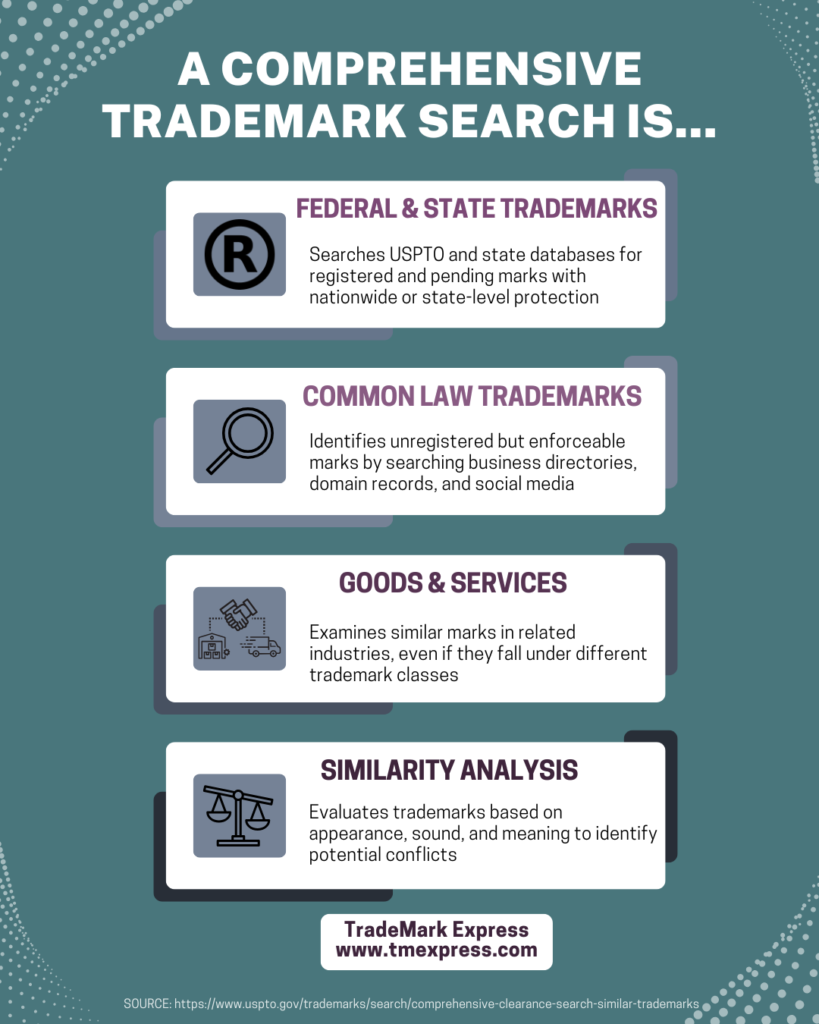Can You Trademark a Name Without a Trademark Search?
If you’re a small business owner, entrepreneur, or startup founder working on your brand, a common question comes up: Can you trademark a name without a search?
Technically, yes—you can. The U.S. Patent and Trademark Office (USPTO) doesn’t require a search before filing a trademark application.
But here’s the real question: Should you?
The USPTO itself strongly recommends conducting a comprehensive trademark search before submitting an application. Why? Because filing without doing your homework first can create major—and expensive—problems later on.
What a Trademark Search Actually Does
A comprehensive trademark search is far more than just typing a name into the USPTO’s online database.
A proper search investigates:

- Federal trademarks already registered or pending with the USPTO
- State trademark registrations
- Common law trademarks—unregistered marks that are still legally protected through use
- Similarities in:
- Sound (e.g., “Lite” vs. “Light”)
- Appearance (e.g., stylized names or misspellings)
- Meaning (e.g., synonyms or translations)
- Same or related goods/services—since conflicts often arise even if the names aren’t identical
The goal is to uncover anything that might block your registration or result in a legal challenge down the road.
Risks of NOT Doing a Trademark Search
Skipping the search might save you time and money upfront—but it can cost you a lot more later.
Here are some real risks of not doing a trademark search:

- USPTO Rejection: If there’s a conflict, the USPTO will refuse your application—and you won’t get your filing fee back.
- Cease-and-Desist Letters: You may unknowingly infringe on someone else’s rights, which can lead to legal disputes.
- Costly Rebranding: If you’ve already launched with the name, being forced to change it means rebuilding your identity from scratch—logos, packaging, marketing, and more.
It’s a classic case of “pay now or pay more later.”
Do I Need a Trademark Search?
If you’re asking yourself, do I need a trademark search, the answer is clear: yes—especially if you’re serious about your brand.
Even if you feel confident that your name is unique, the only way to know for sure is to check. The cost of filing blindly can be far greater than the cost of a search.

Yes, you can trademark a name without a search. But doing so is a gamble—and the odds aren’t in your favor.
A trademark search isn’t just a legal formality. It’s a smart, proactive step that helps you avoid conflict and secure your brand with confidence.
How a Professional Search Can Save Time, Money, & Headaches
Many entrepreneurs do a quick search on the USPTO’s Trademark Search system and assume they’re good to go. Unfortunately, that search is limited—and many conflicts aren’t immediately obvious.
Professional trademark search providers look much deeper. They examine federal, state, and common law databases and evaluate not just identical matches, but confusingly similar ones. That kind of thoroughness gives you clarity and reduces the risk of surprises after you file.
If you’ve already invested in design, branding, packaging, or promotion, a professional search helps ensure that investment is protected.
Need help with a trademark search?
TradeMark Express offers comprehensive trademark searches and professional application preparation services tailored to small businesses, startups, and entrepreneurs.
Contact us today to take the first step in protecting your brand the right way.
